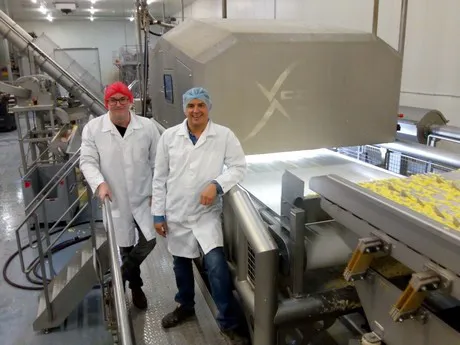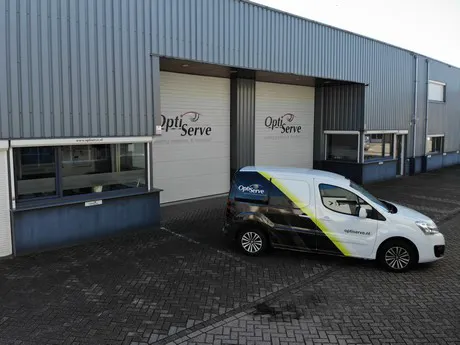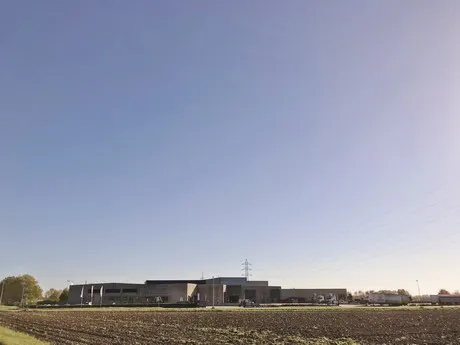Two years ago, Optiserve introduced their optical sorter Xcalibur. The sorter is now being sent all over the world. Particularly unique is the way the machine scans and expels the potato products. Pomfresh took the machine into use in February 2018.

Xcalibur surpasses all expectations
Since its presentation, the machine has been installed for multiple major European potato processors. “This proves the market is ready for the new generation of optical sorters,” says Antoine van Kasteren of Optiserve. According to him, the sorter has a few unique characteristics. Firstly, he mentions speed. While other machines operate at three metres pre second, Xcalibur can achieve 5.2 metres per second. “This means production and capacity go forward more quickly and machines can become narrower, which is a proper improvement. Besides, the machine can recognise objects, so that the products can be counted in numbers in-line. After an hour, we can see exactly which products have passed by on the machine, the number of expulsions and the lengths of the products.”
Antoine explains products are normally sorted for spots, lines or dots, while object recognition maps all desired characteristics of products. This could be length, colour and defects. The computer system sorts for structure, mass, shape and colour. “Because of that you can sort much more extensively and accurately, by simply setting up the all-rounder for type of product, desired quality and other specific requirements. We don’t actually sort for defects, but for objects. It’s also possible to sort out a certain length for the processing industry or good product when a batch of poorer potatoes is put into the machine. That’s why we prefer calling Xcalibur a ‘classifier’ instead of a sorter. Everything is clear, which is to the benefit of the sorting quality. Besides, analysing data is becoming increasingly important, and we can provide in that better thanks to object recognition.”

Intelligent expelling is unique
The patented manner in which Xcalibur scans and expels potato products, ‘Intelligent Puffing,’ is particularly unique. The products passing by are mapped using four cameras combined with intelligent software. The position on the conveyor belt doesn’t play a part in that. The machine creates realistic images of the potato products, so that it also becomes clear how the product is positioned. After that, the machine makes a decision in a fraction of a second: approve or expel. Per second, the machine handles 3,500 to 4,000 objects. “The defects are expelled using compact valves with switching speeds of one millisecond. The expulsion is so accurate and powerful that the object practically doesn’t affect the ‘good’ product,” Antione explains.
The sorter can be linked to the data network of the entire production line, so that the various programmes can communicate with each other. As a result, the sorter can be further aligned to the other components of the line in order to increase total efficiency. With Xcalibur, Optiserve mostly focuses on potato processing companies, particularly the chips industry. The machine is now operational for multiple products, and Antoine feels positive about the future of Xcalibur. “The chips industry is still growing. New factories are being constructed globally. Regarding this, the world’s our oyster.”

Quality comes first
Belgian potato processing company Pomfresh supplies various fresh and cooked premium products, such as small potatoes, potato squares and slices. The company recently bought Xcalibur from Optiserve. Pierre Gilliard, factory manager of Pomfresh, talks about the decision to buy this machine because of its high performance rate when sorting final products.
“For us, quality of our products comes first. We were looking for an optical sorter that would take a final critical look at our final products before they leave the factory.” After the quality inspection conducted by Xcalibur, the products are packed. According to Pierre, it’s a complete machine. “It might not be the cheapest machine, but it’s one of the best, technically.” Pierre is full of praise about the cooperation with Optiserve. “The machine is followed by Optiserve at a distance. They offer extraordinary service.”
Innovation as biggest challenge
The biggest challenge for Pomfresh is industrialising innovative products. “Our goal isn’t to achieve large volumes, as is the case for larger competitors. Instead, we focus on cooked and fresh products that are innovative and of superior organoleptic quality, and with an acceptable price.” Pomfresh also entered into a cooperation with Colruyt in that context. Together, they’re working on developing new recipes. According to Pierre, processed potato products are popular among consumers.
Pomfresh guarantees the quality of the products because of the manner in which the potatoes are processed. “We use autoclaves to process the products. This ensures a good flavour. We use practically only firm potatoes that are already good quality when the process starts.” Besides conventional potato products, Pomfresh also has an organic assortment. France and Belgium are Pomfresh’s most important markets. The products are sold in three market segments. “Industry uses our products to process into ready-meals, such as potato salad. We also work with retail and food service to supply, for instance, school cafeterias with potato products.”
Potato as basic element
It isn’t an easy year on the potato market. “Because of the dry weather, the potatoes are small and expensive. Fortunately, customers are adapting to that. The potato continues to be a basic element in a lot of kitchens.”
